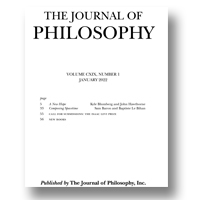|
|
|
1.
|
The Journal of Philosophy:
Volume >
120 >
Issue: 12
Paul Studtmann
God and the Numbers
abstract |
view |
rights & permissions
| cited by
According to Augustine, abstract objects are ideas in the mind of God. Because numbers are a type of abstract object, it would follow that numbers are ideas in the mind of God. Call such a view the “Augustinian View of Numbers” (AVN). In this paper, I present a formal theory for AVN. The theory stems from the symmetry conception of God as it appears in Studtmann (2021). I show that the theory in Studtmann’s paper can interpret the axioms of Peano Arithmetic minus the induction schema. This fact allows for the development of arithmetic in a natural way. The development eventuates in a theory that can interpret second-order arithmetic. The conception of God that emerges by the end of the discussion is a conception of an infinite, ineffable, self-cause that contains objects that not only serve as numbers but also encode information about each other.
|
|
|
|
|
|
|
2.
|
The Journal of Philosophy:
Volume >
120 >
Issue: 12
Wayne A. Davis
Epistemic Possibility, Concessive Knowledge Attributions, and Fallibilism
abstract |
view |
rights & permissions
| cited by
I argue that modal terms have an epistemic interpretation on which concessive knowledge attributions are semantically contradictory. This is compatible with the fallibilist view that the basis on which we know something need not entail it, but not with the view that what is known need not be epistemically certain or necessary. The apparent contradictoriness of concessive knowledge attributions is not due to mere implicature, nor to assertion updating the modal base. And it is contextually invariant. Concessive knowledge attributions contrast markedly with concessive assertions and Moorean conjunctions, whose infelicity is plausibly due to norms of assertion. I briefly explain why the strict fallibilism I recommend is compatible with our ordinary use of ‘know,’ and with our knowing much on the basis of perception. Its contextual shiftiness closely parallels our variably strict use of temporal and other invariant terms with strict application conditions.
|
|
|
|
|
|
|
3.
|
The Journal of Philosophy:
Volume >
120 >
Issue: 12
Avril Styrman
The Passage of Time as Causal Succession of Events
abstract |
view |
rights & permissions
| cited by
This work introduces a causal explanation of the passage of time, and contrasts it with rival explanations. In the causal explanation, laws of physics are shown to entail that events are in causal succession, and the passage of time is defined as their causal succession. The causal explanation is coupled with phenomenology of the passage of time, and contrasted with the project of making sense of the idea that time does not pass.
|
|
|
|
|
|
|
4.
|
The Journal of Philosophy:
Volume >
120 >
Issue: 12
Call for Submissions: The Isaac Levi Prize
view |
rights & permissions
| cited by
|
|
|
|
|
|
|
5.
|
The Journal of Philosophy:
Volume >
120 >
Issue: 12
Index to Volume CXX
view |
rights & permissions
| cited by
|
|
|
|





